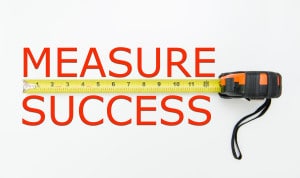As the saying goes, what gets measured gets done. How are you measuring your sales managers? One metric is, of course, “% of plan.†But you already know that.
Every sales manager wants to be provided with a clearly defined target. Give them a clear target and they will hit it. The trouble with providing them with only one metric focused on end results, such as “% of Plan,†is that sales managers can become very short-term focused. They will put their effort into chasing big deals instead of coaching. So your sales teams aren’t being built to last.
As I’ve taught sales leaders for many years, you can’t really manage results; you can only manage the system that produces the results. So here are four additional “system†metrics that can focus your sales managers’ attention on aspects of their duties & responsibilities that will help build stronger sales teams.
1) Number of reps on plan – aka “Team Healthâ€
With this metric you can ensure that your sales managers focus on coaching their entire team. One unsuccessful instinct that many sales managers have is to focus their time and attention on chasing big deals. The trouble is, they then focus their time and attention on their reps who are working the largest deals – which are usually the most experienced “A†players – the reps who need the least amount of coaching.
When you measure the # of reps on plan you send a loud and clear message to your sales managers to coach all their reps. That creates better team health.
2) New-hire productivity
This measures how fast a sales manager ramps his/her new-hires. Define what results you expect of new hires over their first year on the job. For example, sales in the three quarters following their first quarter (months 4–6, months 7–9, and months 10–12). Then measure your sales managers on their new-hires’ percentage of attainment for those targets. This will help remind sales managers that they need to provide the necessary time and attention to new hires to ensure they ramp up to quota quickly.
3) Number of reps promoted
Any business that wants to grow must be focused on growing its future leaders. Perhaps there is no more important metric than this one – because it tells you a) how effective a sales manager is at hiring, and b) developing those people to such a high level that they are chosen for promotion into a sales team leader.
4) Turnover/retention
Some turnover is good. Too much turnover can be devastating.
You don’t want zero turnover, because that would indicate that poor performers are being retained. Some turnover is good because not everybody can make the grade with your company In my sales manager workshops I often ask managers for a show of hands: “How many of you have a rep performing poorly that you need to do something about?†Just about every hand in the audience goes up. Then I ask, “How long has this situation been going on?†Ouch! Answers come in months – even years.
But on the flipside, too much turnover – and especially the loss of successful salespeople – can be devastating to a team. Not only does the team lose a top producer, it may be losing its “bell cowâ€: the rep that everyone else on the team follows, because he or she is the team’s most successful example.
The number 1 reason why productive salespeople leave an organization is their relationship with their immediate supervisor. Nothing can be more devastating to a sales team than the departure of that team’s top performer. This metric tells you how effective a sales manager is at creating a sales culture that experienced salespeople want to be a part of, as well as one that weeds out the rotten apples.
What gets measured gets done
By implementing these additional four metrics, you will be measuring the sales management skills that are most important when trying to develop sales teams that are “built to last.†And if you improve these four metrics, you’ll also improve that all-important results metric: % of plan. Now that’s leadership!



One major factor that is always missed out is capability index of the Rep and the Team. Cycle time and standardisation of processes that can address the rudumentary tasks with speed and urgency. Sending proposals, sending collaterals, networking with prospects and competitiors. Ability to be charismatic – a function of likability and competence. I feel this needs a special 360 degree process to pick up data points that can measure.